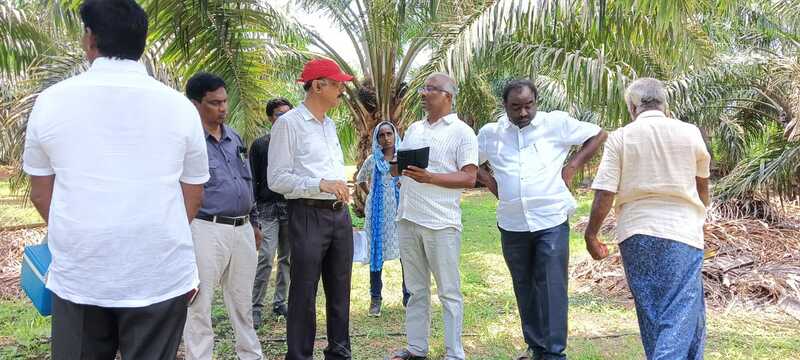Article Today, Aswaraopeta: Allegations of large-scale irregularities have rocked oil palm plantations in Telangana. Farmers in Asannagudem village claim that genetically defective plants have been supplied to them over the years, causing significant financial losses. During a recent inspection by scientists from the Indian Institute of Oil Palm Research (IIOPR) and representatives of the Oil Palm Growers Society, shocking irregularities came to light. The incident has raised suspicions of a larger conspiracy involving official negligence and mismanagement.
Male-Dominant Plant Ratio Raises Alarm
In one plantation owned by a farmer named Murali, scientists observed that nearly 75 percent of the five-year-old oil palm plants were male. Only a few female plants were found, rendering the crop commercially unviable. Other farmers in the area echoed similar concerns, stating that this issue has persisted across multiple plantations since 2016. They blamed officials for their failure to supply healthy, high-quality saplings, despite the region’s long-standing experience in oil palm cultivation.
Negligence or Deliberate Cover-Up?
Farmers are questioning the silence of Oilfed officials and members of the oil palm advisory committee. They accuse authorities of ignoring complaints and concealing critical information from the government. Grower representatives demand transparency and accountability. They have warned that failure to address the issue will be seen as a betrayal of the farming community. The farmers’ association claims to possess concrete evidence of fraud in sapling distribution and has vowed to release it soon.
Three Types of Genetic Defects Detected
Following the inspection, experts concluded that the affected plantations contain at least three distinct genetic or off-type plant variations. These abnormalities, they said, go beyond mere negligence and point to deliberate malpractice. The findings have intensified calls for an independent investigation into the sourcing and distribution of saplings over the past decade.
Old Scars of Mismanagement Resurface
According to oil palm farmer leader Umamaheswar Reddy, the problem traces back to the period between 2016 and 2020. During this time, Oilfed officials reportedly supplied saplings sourced from Costa Rica’s “Spring” variety, along with a batch of local varieties. However, farmers now say that the plants in their fields don’t match the claimed varieties. This discrepancy casts doubt on the credibility of official statements and revives allegations of mismanagement dating back to the tenure of former Chief Minister Y. S. Rajasekhara Reddy.
Farmers Demand Accountability
The farming community is demanding corrective measures and compensation for their losses. They urge the state government to take action against those responsible for the flawed sapling supply chain. As the evidence mounts, farmers remain firm in their stance that unless action is taken, oil palm cultivation in the region will face irreversible decline.



